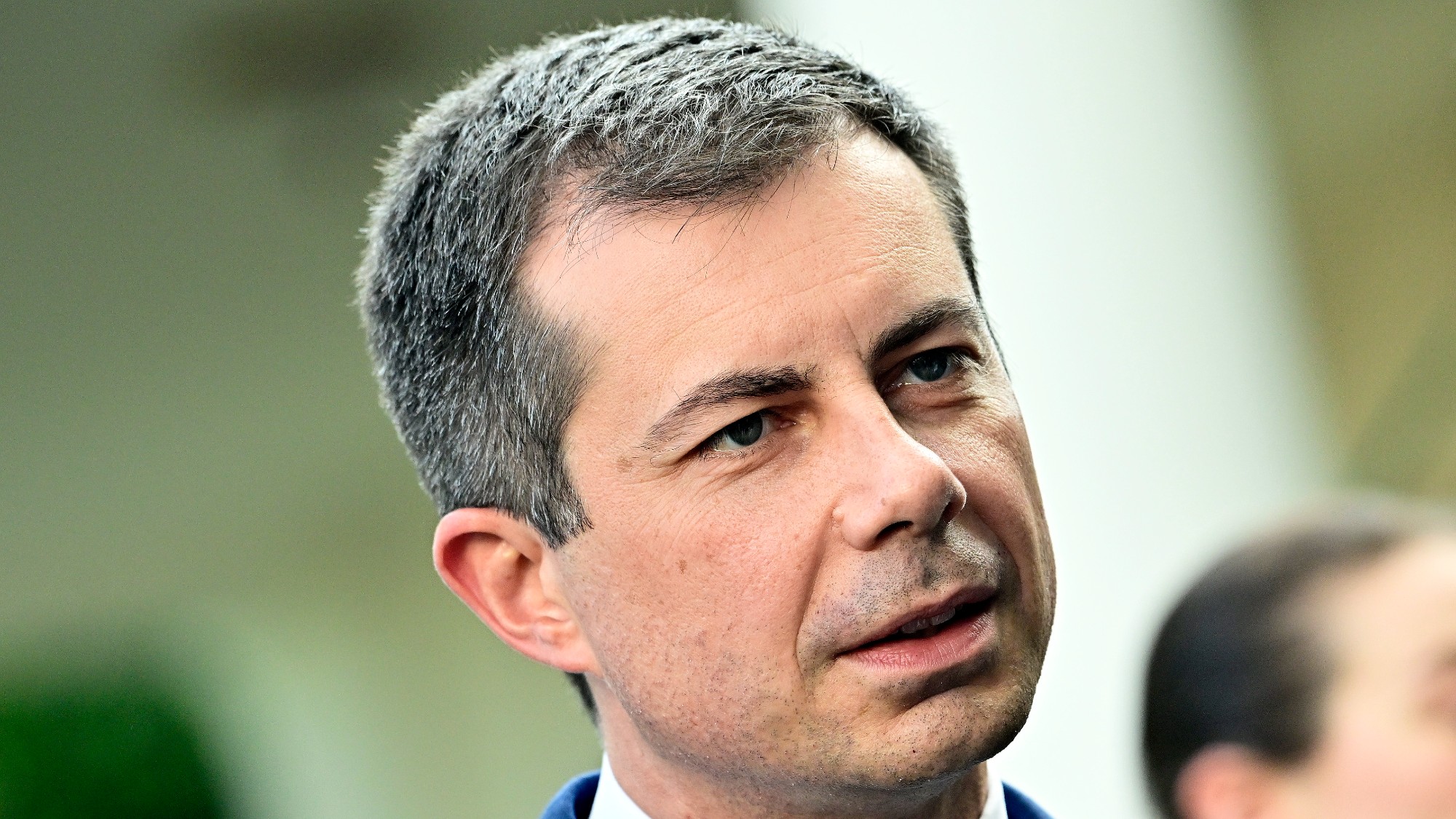What McKinsey really suggests about Pete Buttigieg
Be afraid


A free daily email with the biggest news stories of the day – and the best features from TheWeek.com
You are now subscribed
Your newsletter sign-up was successful
South Bend, Indiana, Mayor Pete Buttigieg is under scrutiny for his stint working for the consulting firm McKinsey — perhaps because his record is so short that there is little else to discuss. After weeks of stonewalling, claiming he couldn't discuss details because he had signed a non-disclosure agreement, Buttigieg finally released vague details about his years at the company. He apparently did cost-cutting for a health insurer, price analysis for a grocery store chain, a study on energy efficiency for the EPA and several nonprofits, and something in 2009 for the U.S. government in Iraq and Afghanistan to increase "employment and entrepreneurship in those countries' economies." (I for one would like to hear more about that last one.)
Yet the details of Buttigieg's McKinsey career are less important than the sheer fact of that career itself. As a former consultant for the company writes for Current Affairs, McKinsey is a defining institution of modern America, an organization that leverages elite connections and a glitzy reputation to obtain bloated consulting contracts across the country. These contracts are then typically executed by wet-behind-the-ears Ivy League grads whose most distinguishing characteristic is a disregard for the welfare of the affected people or institutions.
It's the perfect encapsulation of the Buttigieg candidacy.
The Week
Escape your echo chamber. Get the facts behind the news, plus analysis from multiple perspectives.

Sign up for The Week's Free Newsletters
From our morning news briefing to a weekly Good News Newsletter, get the best of The Week delivered directly to your inbox.
From our morning news briefing to a weekly Good News Newsletter, get the best of The Week delivered directly to your inbox.
The McKinsey mindset has been under close scrutiny of late, perhaps inspired by Buttigieg himself. ProPublica and The New York Times recently reported that the company has gotten a $20 million contract with Immigration and Customs Enforcement (ICE) helping them run their immigrant camps and mass deportation apparatus. McKinsey consultants "proposed cuts in spending on food for migrants, as well as on medical care and supervision of detainees," Ian MacDougall writes, and looked for ways to accelerate the deportation process.
ICE is one of the most brutally callous parts of the U.S. government, and that is saying a lot. Yet McKinsey's proposals were so ruthless they unsettled even agency staff — they "questioned whether saving pennies on food and medical care for detainees justified the potential human cost," while the deportation speed-up raised due process concerns.
And it turns out, nearly two dozen people have died in ICE custody from 2013-18, many because of incompetent, skinflint management — poor record keeping, indifferent medical care, and worse. U.S. citizens have been detained or even deported. The agency even refused donated flu shots recently, leading to three children dying of the disease.
Neverthless, McKinsey wormed its way so far into the ICE machine that they eventually ended up overseeing themselves. They ghostwrote a "contracting document that defined the consulting team's own responsibilities and justified the firm's retention, a contract extension worth $2.2 million," writes MacDougall. (I suppose "metrics" are easier to meet if you can just write them yourself.)
A free daily email with the biggest news stories of the day – and the best features from TheWeek.com
ProPublica also reported this week on a $27.5 million McKinsey contract with New York City to improve conditions in the Riker's Island jail. The firm initially reported that their strategies had decreased violence by 50 percent in their test areas — but it turns out they had rigged the stats by stacking those areas with low-risk offenders. Overall violence in the jail had actually increased by 50 percent over the period, and the city eventually canceled the contract and decided to close the facility.
But perhaps we are being too hard on McKinsey. The city should certainly have seen this coming — what do you expect from a bunch of Harvard naifs doing prison commissioner cosplay?
These contracts are incredibly pricey not just in overall terms, but in what is actually being delivered. As Matt Stoller details, McKinsey charges the federal government over $56,000 a week — or nearly $3 million a year — for the consulting work of a college graduate with no experience. That's after a 10-14 percent price hike in 2016 — which was initially denied by the contracting officer, but then accepted after McKinsey went over his head to his boss to complain. A report from the inspector general of the General Services Administration found this deal cost the public up to $69 million from 2016 onward, in addition to probably being illegal, and recommended canceling McKinsey's entire contract across the whole government.
The Houston Astros even hired a former McKinsey guy to take over as general manager. He took them to the top of professional baseball by — how else? — cheating. The Astros surveilled opposing teams to learn their pitch signs, then rigged up a camera to watch the opposing team's catcher when their side was at bat. When an off-speed pitch was signaled, a guy in the dugout watching a laptop whacked a trashcan with a bat loud enough that the Astros batter could hear — and everyone else too, including the TV microphones. Classic McKinsey mindset. As David Roth writes, the "members of the team's brain trust of thoroughbred data nerds simply took it for granted that they could get away with it."
That brings us back to Buttigieg. In the first instance, his campaign relies on two McKinsey staples: cynicism and a win-at-any-cost mentality. He's shifted his positions radically to court big donors and lobbed cheap attacks on his own positions from a year ago. He went from supporting Medicare-for-all, to claiming that his more conservative plan was a better way to get to the same goal, to attacking it with misleading right-wing talking points. He's also raised gobs of money from American oligarchs on Wall Street and in Silicon Valley. On their advice, he has reportedly dropped more radical proposals to restructure the Supreme Court and ditch the Electoral College from his stump speech.
But perhaps the most marked McKinsey trait in the Buttigieg campaign is the effrontery of the thing. Next to Trump he would be the least experienced president in history, by a considerable margin. He's never held statewide office of any kind, nor federal office, nor a significant military command position. Being president is a stupendous burden at the best of times. But it takes an incredible amount of arrogance to look at the crushing problems facing America in every direction and think that running a smallish Indiana city for a few years is sufficient preparation.
But that's the McKinsey mindset — the idea that a bunch of clueless Harvard dweebs can solve any problem in 10 minutes with a spreadsheet and a slick slideshow (that'll be $50 million, please). And if you can't actually do the job, just bend the rules.
It doesn't bode well for a Buttigieg administration.
Ryan Cooper is a national correspondent at TheWeek.com. His work has appeared in the Washington Monthly, The New Republic, and the Washington Post.
-
 What to know before filing your own taxes for the first time
What to know before filing your own taxes for the first timethe explainer Tackle this financial milestone with confidence
-
 The biggest box office flops of the 21st century
The biggest box office flops of the 21st centuryin depth Unnecessary remakes and turgid, expensive CGI-fests highlight this list of these most notorious box-office losers
-
 The 10 most infamous abductions in modern history
The 10 most infamous abductions in modern historyin depth The taking of Savannah Guthrie’s mother, Nancy, is the latest in a long string of high-profile kidnappings
-
 The billionaires’ wealth tax: a catastrophe for California?
The billionaires’ wealth tax: a catastrophe for California?Talking Point Peter Thiel and Larry Page preparing to change state residency
-
 Bari Weiss’ ‘60 Minutes’ scandal is about more than one report
Bari Weiss’ ‘60 Minutes’ scandal is about more than one reportIN THE SPOTLIGHT By blocking an approved segment on a controversial prison holding US deportees in El Salvador, the editor-in-chief of CBS News has become the main story
-
 Has Zohran Mamdani shown the Democrats how to win again?
Has Zohran Mamdani shown the Democrats how to win again?Today’s Big Question New York City mayoral election touted as victory for left-wing populists but moderate centrist wins elsewhere present more complex path for Democratic Party
-
 Millions turn out for anti-Trump ‘No Kings’ rallies
Millions turn out for anti-Trump ‘No Kings’ ralliesSpeed Read An estimated 7 million people participated, 2 million more than at the first ‘No Kings’ protest in June
-
 Ghislaine Maxwell: angling for a Trump pardon
Ghislaine Maxwell: angling for a Trump pardonTalking Point Convicted sex trafficker's testimony could shed new light on president's links to Jeffrey Epstein
-
 The last words and final moments of 40 presidents
The last words and final moments of 40 presidentsThe Explainer Some are eloquent quotes worthy of the holders of the highest office in the nation, and others... aren't
-
 13 potential 2028 presidential candidates for both major parties
13 potential 2028 presidential candidates for both major partiesIn Depth A rare open primary for both parties has a large number of people considering a run for president
-
 The JFK files: the truth at last?
The JFK files: the truth at last?In The Spotlight More than 64,000 previously classified documents relating the 1963 assassination of John F. Kennedy have been released by the Trump administration
